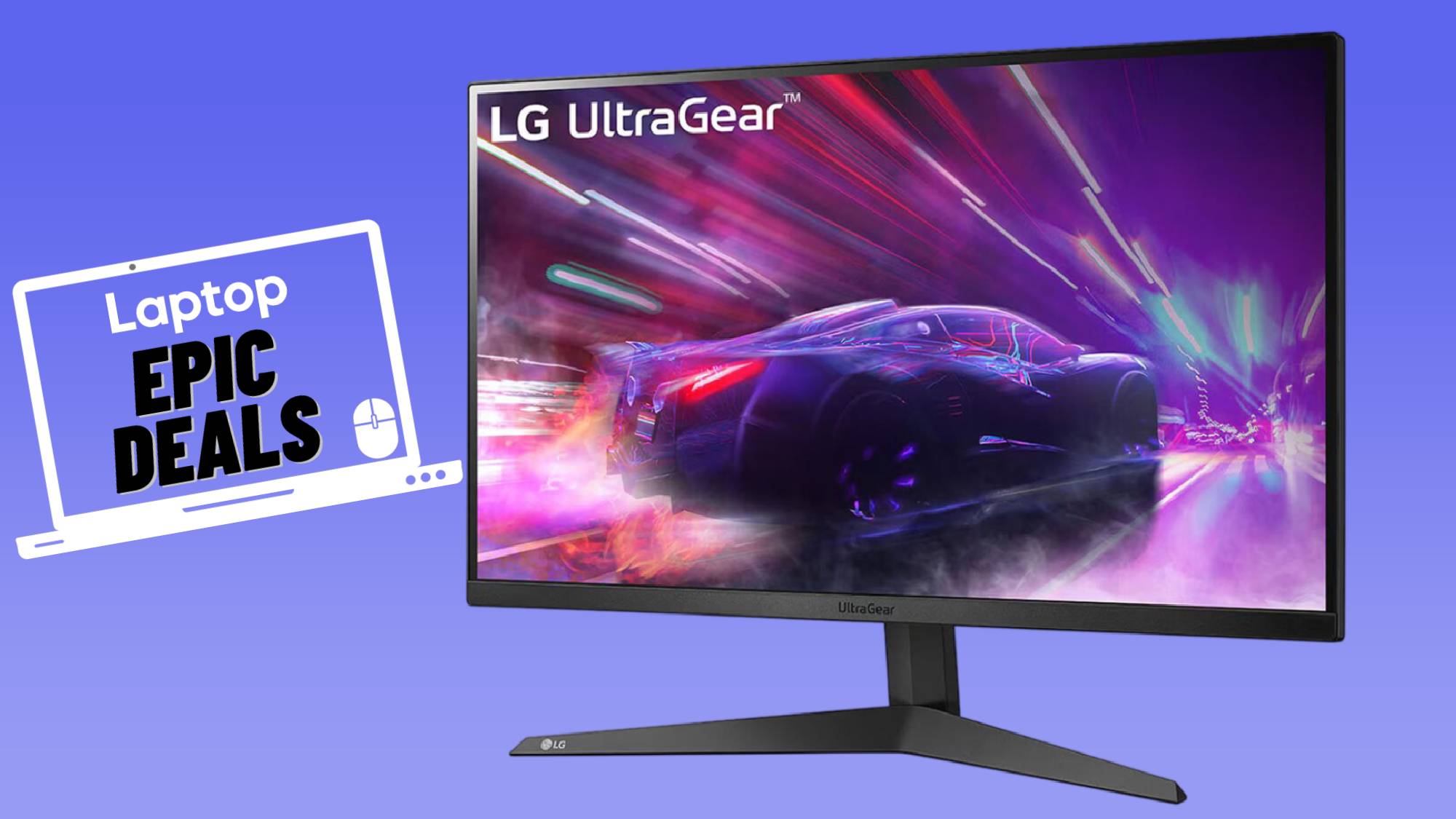How the Surface Laptop Reinvented Notebook Design
With the exception of gaming laptops, the traditional notebook has become pretty boring-looking. Hey, look: It’s another system that flips around! Those bezels are slightly thinner! You know the drill.
But the Surface Laptop is a notebook that looks — and feels — truly different.
The most innovative aspect of Microsoft’s new creation is the way it uses Alcantara fabric around the keyboard deck. It feels soft and a lot more comfortable than your typical rigid, metal palm rest. I immediately noticed that stark difference when typing on the Surface Laptop for the first time.
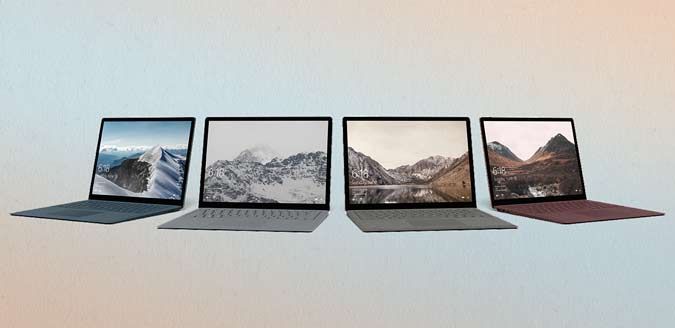
In an interview with Laptop Mag, Peter Kyriacou, program manager for the Surface team at Microsoft, explained why the company opted to use this material for the new laptop.
“We wanted to make a laptop that was personal — something that invited you in and was soft and warm to use,” Kyriacou said. “That was the first step.”
Alcantara, Evolved
This isn’t the first time Microsoft has used this fabric; it’s also found on the Signature Type Cover for the Surface Pro 4. “We got to learn how the material works and processed it to be part of the Surface Laptop,” Kyriacou told Laptop Mag. This time around, the Surface team evolved and honed the “hand-feel” while extending the color offerings, he said.
Stay in the know with Laptop Mag
Get our in-depth reviews, helpful tips, great deals, and the biggest news stories delivered to your inbox.
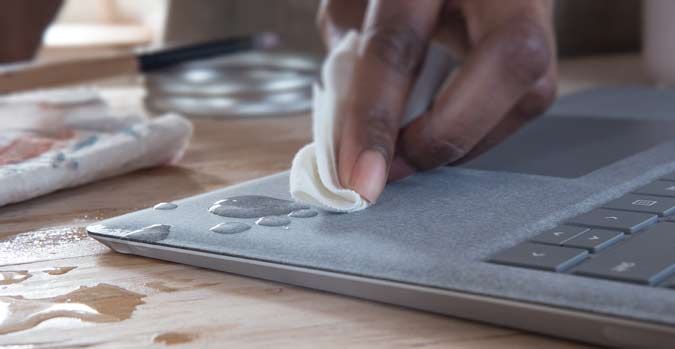
Worried about stains? The Alcantara-covered keyboard is treated with a polyurethane coat, which is designed to make it a bit easier to clean and more durable. Kyriacou told us that you can easily care for the fabric by regularly wiping it clean with a damp, lint-free cloth.
The folks over at VentureBeat stain-tested the Alcantera keyboard for the Surface Pro, and found that it stood up well to pizza and wine. It can also shrug off coffee, but only if you wipe it off right away.
MORE: Microsoft Surface Laptop vs. Surface Book: Which Is Right for You?
The second step in making the Surface Laptop personal was to offer a variety of colors. Unfortunately, you’ll need to pay $300 above the base model to move beyond the blah platinum hue to get your hands on the cobalt blue, graphite gold or burgundy models. But I really like how the anodized-aluminum lid and bottom match the fabric deck, which makes for a nice 360-degree design.
“The Alcantara is tone-matched for devices, and it’s something we worked very closely with Alcantara to make on our products,” Kyriacou said.
The Sight of Silence
Another defining characteristic of the Surface Laptop is what you don’t see. The designers took pains to ensure that all seams and screws remained hidden from view. That’s why Microsoft calls it a “silent design.”
“We feel that the hardware needs to disappear into the background and have no distractions for the user,” Kyriacou said. “You will notice on this design that the glass is optically aligned right into the aluminum top and that there are no breaks in the fabric.”
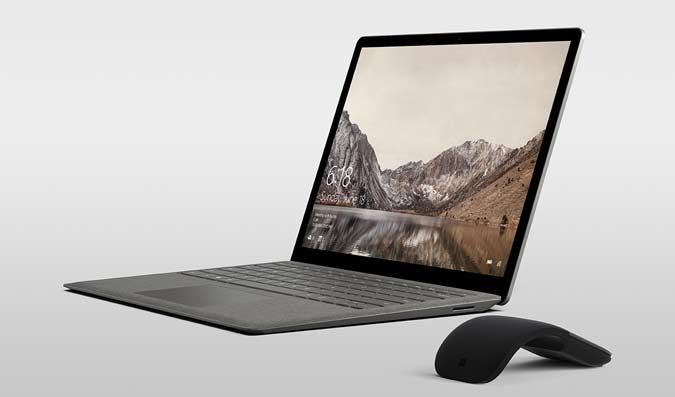
Microsoft took a similar approach in designing the Surface Pro and, based on that knowledge, developed a special process that laminates the fabric to the chassis.
We feel that the hardware needs to disappear into the background and have no distractions for the user.
It was equally important for the team to ensure the Surface Laptop stayed cool under pressure. Microsoft designed a thermal cooling system that enables the Surface Laptop to run a full dual-core processor at peak performance.
“We integrated the thermal vapor chambers into the bottom chassis of the Laptop, designing heat quickly as vapor inside them changes states,” Kyriacou said.
What’s Missing
Despite those innovative components, there are some things we don’t love about the Surface Laptop’s design. For example, you don’t get a USB Type-C port or a Thunderbolt 3 connection, which a lot of premium laptops do have these days.
Microsoft defended the move by citing the confusion around the standard and quality-control issues related to the multitude of peripherals.
“Although we see the industry trend towards USB-C, the promise of consistency and efficiency isn’t quite there,” Kyriacou said. “Customers still have to carry dongles and can end up in situations where certain cables and power supplies will not work with their device.”
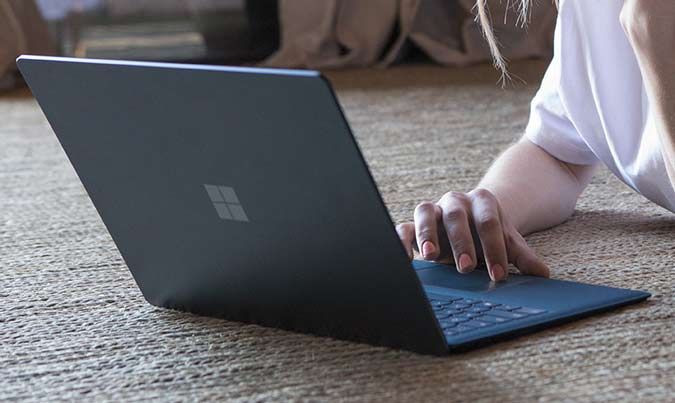
Instead, Microsoft decided to continue with its Surface Connect port, which offers power, video and data. It’s a port the company has been using since the Surface Pro 3.
Microsoft also left out an SD card slot in the Surface Laptop — an omission that may miff some shoppers. That means you won’t be able to easily transfer photos from a digital camera. But Kyriacou said it wasn’t even a consideration for this device, pointing to the Surface Book as the right machine for mobile professionals who need that option.
Lastly, the screen on the Surface Laptop doesn’t bend all the way back as convertibles such as Lenovo’s Yoga 910 do. The display doesn’t even lie flat when bent back, even though it is a touch screen. You’re limited to 135 degrees, instead of the 180 degrees some other machines offer.
For Students or the Masses?
So who should buy the Surface Laptop? Clearly, Microsoft is targeting students, which why the company is placing such a big emphasis on the streamlined-yet-limited Windows 10 S operating system. But Microsoft also believes the Surface Laptop has mass appeal.
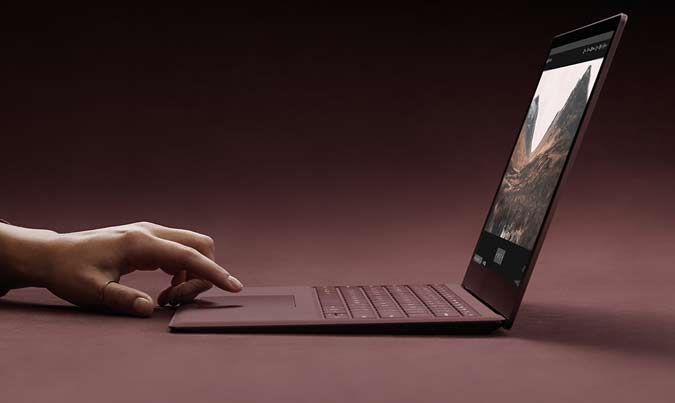
Microsoft knows this from experience, as the appeal for the Surface Pro and Surface Book extend beyond the target shopper. “They have an audience that we focused on, but there’s many people who love them,” Kyriacou said. “This fits well into the overall family.”
But that doesn’t mean the Surface Laptop fits in with the tons of other notebooks lining store shelves. In fact, that’s exactly why it could be this year’s must-have Windows machine.

